Just like in the rise of man, there have been a number of evolutionary dead ends in automotive body styles. One of those is the phaeton. Phaetons were open four-door vehicles that used side curtains instead of roll-up windows. Wildly popular in the first decades of the automobile, they were largely extinct by the close of the 1930s. Survivors like these two cars are still around and coveted by collectors. Take a look at these two Ford phaetons, a 1937 and a 1938 model, for sale on craigslist in San Diego, California. Rarer than the proverbial hen’s teeth, these two drop tops are for sale together in the ad, but only the 1938 model has a price. Is $37,500 too much to ask for this end-of-the-line Ford? Thanks again go to Gunter K. for the find!
Think for a second about the emergence of the automobile in the very late 1800s and early 1900s. Cars were an evolution of the carriage, wagon, and other horse-drawn vehicles of the era. Minus, of course, the smelly horse and all the aggravations that went with it. Still, it was hard to move past this way of thinking. Nearly all of these early cars were open designs, and tops that went up to shield passengers from the elements were an integral part of the experience. The larger the car, the more doors you have. While roll-up windows were a ways off, side curtains had been commonplace for a very long time. These were canvas “curtains” that fit into the doors and sometimes the convertible top mechanism. To see out, they either had an area that was unsnapped or had a clear section made up of the best material available at the time. They were cumbersome and slow to install or remove, but they worked. Somewhat.
The technological evolution of the automobile marched ever forward. Closed cars became the predominant choice of consumers, and the percentages of open cars in year-end production numbers fell nearly each and every year. Technology also brought convertibles with roll-up windows, known as the cabriolet or convertible coupe, or convertible sedan. Roadsters and phaetons were still produced, and customers still had to deal with side curtains, but they became rarer or the choice of the cheapest of customers. Some state highway patrols still purchased these cars into the 1930s. I have even heard, but have been unable to verify, that the New Jersey State Police outfitted some of their officers with Ford phaetons in 1935. Can you imagine how cold it would be in a phaeton during a New Jersey winter?
Ford carried the torch for side curtain-equipped cars longer than everyone else it seems. The last Ford roadster was built for the 1937 model year. Phaetons enjoyed an extra year, bowing out in 1938. Production of phaetons in 1937 was very low 3,723 cars were built. In 1938, that number was just 1,169. For a volume manufacturer like Ford to waste its time on a handful of poor-selling models such as this makes no sense. Both cars obviously used convertible sedan bodies without the roll-up windows. The top mechanisms were also likely the same or very similar. The tooling alone to build the phaeton-specific pieces must have eaten up any possible profit.
Despite all of this, these last of the breed phaetons were produced. While there is no way to tell just how many survived the number has to be a small percentage of production. To find two of these rare cars in one ad is amazing in itself. The first is a 1937 model. Little is said in the ad other than that it is available for purchase as well. The single picture shows a car that appears to have been headed for a mild custom job. For some reason, perhaps a lowered front axle, the new appearing steel wheels, and black wall tires seem to be higher up in the fender than stock. From there what else has been done and what parts are still there is anyone’s guess. There isn’t even a price listed in the ad.
We know a little more about the 1938 phaeton, and we have a few good pictures. It is advertised as an original southern California car that runs and drives. The owner also discusses how rare the car is in the ad, stating that 40 years of vintage car experience has never revealed another one of these. Of that, I can agree. I have seen pictures of these, but never have I seen one in the flesh. The car does appear to be in good shape as far as the metal goes. The interior is obviously not original to the car, but for a sunny day driver, the car isn’t bad. Restored it would be gorgeous. However, the costs to bring this one back to Early Ford V-8 Club standards would be pretty high. Hopefully, an early Ford lover will purchase this one and make it new again. It is too pretty and too rare to be kept hidden. Have you ever seen a 1937 or 1938 Ford phaeton? If so, please tell us about the car in the comments.
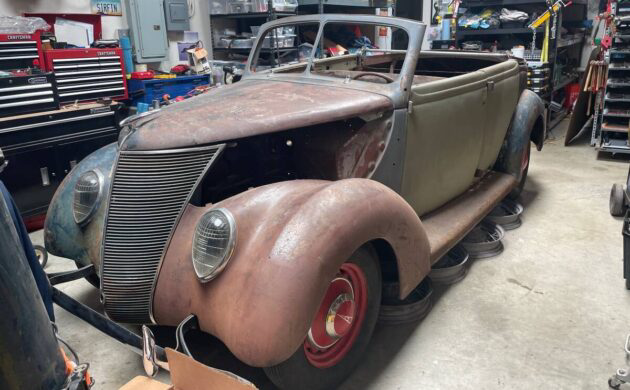
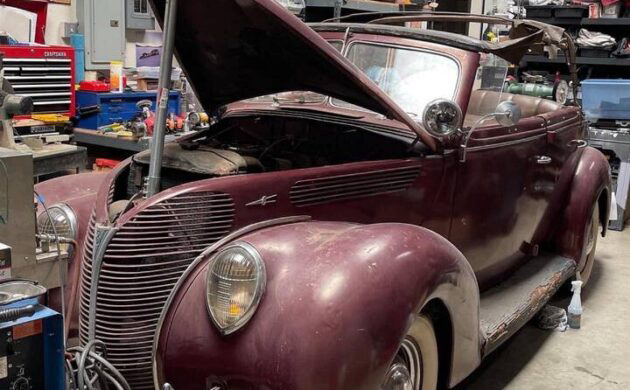
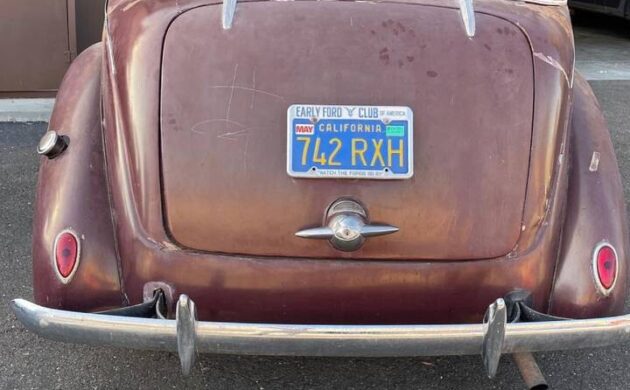
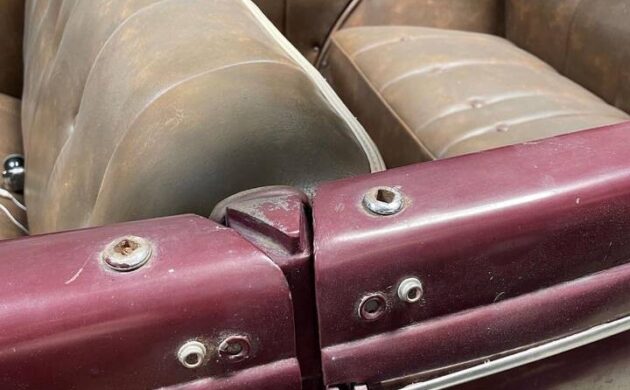
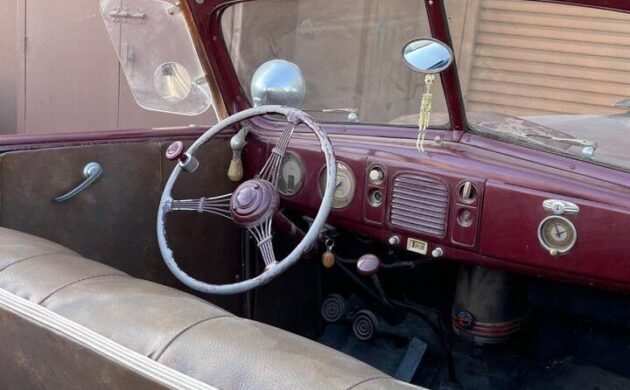
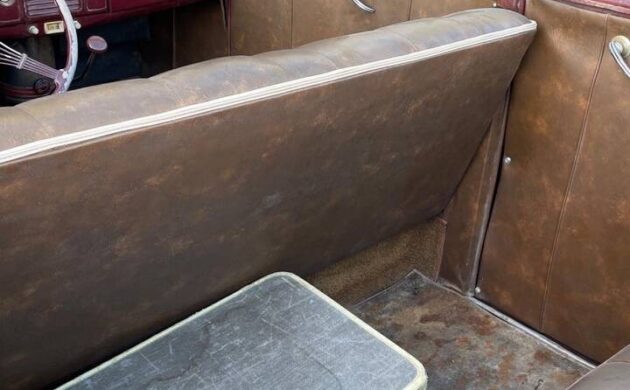




Beautiful cars. May have missed something over the years but those look like the proper wheels for the model years of the the cars. Got our first good look at an example at Harrah’s museum in Reno, NV. Pure art on wheels. With what’s left to do to finish the restoration of these beauties I’d say the price is a bit high.
FDR had a dark blue ’36, which is now in the Hyde Park museum. When I was a kid (long ago) you could walk right up and touch it, but now it’s behind glass. Great car!
Yes, it must be too much to ask. Ad’s been up for over a month and like Bob said kinda pricey for what still needs doing. Maybe try and find a museum that would like to have it.
Nice car but at least $10,000.00 to much. You can buy a nicely restored on for 40k or less
I want a 39-40 Mercury convertible sedan. Beautiful cars with roll up windows.
For years I lusted over a Packard Dual Cowl Phaeton, which in my opinion has the most dramatic body lines of any of these. But after a couple of years I realized that back in the day, no respectible owner of one of these drove their own car.
I don’t want to look like I’m the chauffeur and it’s no fun just to take these to an occasional car show, so my fantasy stayed just that.
I have seen one of these totally restored and they are eye catching for sure. Add the luggage rack to the rear and they are a parade all in themselves!
The Phaetons and Convertible Sedans were generally considered the holy grail of all the early Ford V-8’s. They were the most expensive and also the rarest. That made them somewhat unobtainable and then if you did get one you found out they really weren’t great everyday transportation. It seems the demand went down and many of them ended up in museums and private collections. Next question, “Would I like to have one”. HELL YES!
Not much mention of an engine, other than the reference to a V8. OH, I GET IT! These must be Fred Flintstone specials. That explains everything.
Fun to drive until you got caught in summer rainstorm. Sidewindows – ugh!
Would not drive it in bad weather. : (
Maybe ninja3000 shouldn’t have ‘touched’ FDR’s car,then it wouldn’t be behind glass…!! Kids and cars = no respect. I have a ’39 Convertible Sedan and ’40 Mercury Convertible Sedan,both certainly ‘quirky’ yet just cool enough for my liking.
I like these and have seen a few but I prefer the convertible sedan, for obvious reasons. There was a 37 sedan convertible for sale at the Rhinebeck swap meet a few years ago and it sold quickly.
There was an older collector in Ohio that had both a ’37 roadster and phaeton. Many years ago I paid him a visit and was permitted to extensively photograph the roadster. He asked if I wanted to photograph the phaeton, but being young and dumb, I declined. The last time I passed his building, it was empty.
In the 1980s I developed a friendship with an employee at the Embassy of Chile, who was interested in old cars, and he used to find cars in South America for me. One of the cars I picked up was a 1938 Ford Phaeton, a fully restored car done to typical US standards of work. A very nice black car with Caramel leather interior.
The car was sold new with right hand drive, and I thought having RHD would be of interest for North American collectors because it was so unusual. After showing the car to many potential buyers and hearing over & over again “If it was left hand drive, I’d buy it”, I bought a badly rusted sedan and stripped the LHD parts out, restored them, and converted the car to LHD. Added another $5k to the asking price and quickly sold it.
Ended up selling all the RHD parts to Australia as a “boxed set”. The buyer said he had a LHD 1938 Ford coupe that when new had been converted to RHD under Australian law, accomplished by cutting the steering column in half. After putting the upper half on the opposite side of the dashboard, the 2 steering column sections were connected using bicycle chain and gears!
Buicks last year for the phaeton was 1940 but they didnt make many ; the car in Casablanca was one of them.
Unbelievable ask! IMHO!!
I know who owned this 1938 Ford Phaeton: Late So. Cal. V8 Ford Club Member D. Graham had own it until approx. 1974-75, then my Dad K. Tibbot purchased it from D. Graham. Had many great memories in the car. I was with my Dad when he drove it down to San Diego, to sell it in 1977.
Great story . Yes you are correct on the past owner. I sold the 38 Phaeton two years ago at LA show . Great original car super fun !! Thank you.
Hi, good to know more of the history on my 38 phaeton that I owned a few years ago. It was a good car. I have the 37 Phaeton available. I may take it to LARS in june.
I recently purchased an original unrestored 1935 ford phaeton from the original Byers son. The seller is 85 years old . He has all the stories from his dad using the phaeton to commute 20 miles each day to work in great neck New York. The car came with 4 pallets of spare parts. Many new in the box. This car is totally a blast to drive, starts immediately, and is as smooth as silk. It truly is a parade in and of itself self. Everyone that sees it waves or gives a thumbs up. I will maintain it in its original condition. It is far too nice to restore. It is a privilege to drive.